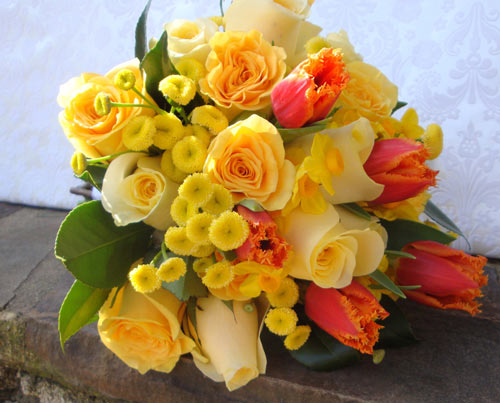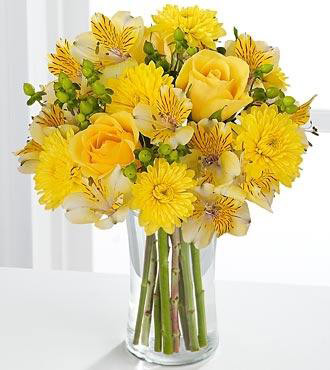當(dāng)前位置: Language Tips> 合作專區(qū)> 英語(yǔ)學(xué)習(xí)專欄
分享到
8月3日,曾是堆滿鮮花、笑容洋溢的慶祝日——我的結(jié)婚紀(jì)念日。自婚姻解體后,它又成了我的傷心日——直到我看到了一堆牛糞的那天。

By Amanda Howland
許嘉人 選注
It is the day formerly known as my anniversary, and I am staring at the biggest pile of manure I have ever seen.
I work on a farm, but not this one. This farm, with its notably large pile of poop,[2] is a dairy farm. The farm where I work is a small pick-your-own flower-and-vegetable farm owned by my cousins.
At the small farm where I work, brides and their friends come to pick flowers for their weddings. Husbands, young and old, collect big bunches of sunflowers for their wives on anniversaries. And one Saturday a family of five—parents and grown children—asked me to take their picture along with the bright bouquet[3] they had picked.
“Our parents have been married 25 years today!” their daughter proudly told me.
On a rainy day in August eight years ago, my family and I visited this same small farm to pick buckets[4] full of flowers for my wedding. Two days later, I was married and, with that, what had been just another day on the calendar turned into a special one, to be celebrated with even more flowers and toasts as long we both should live.
But five years later, when my marriage ended, I wasn’t sure what to do with the day formerly known as my anniversary. Most notable days in the calendar stay that way. Our birthdays are determined upon arrival. In the United States, we eat a lot on the fourth Thursday in November, and we watch fire in the sky on the fourth day of July[5] – none of that is likely to change anytime soon.
My former anniversary no longer holds the happy significance it once did; at the same time it refuses to blend in with the rest of the days of the month, returning to its former status of another ordinary day.
As the third of August rolls around each summer, I cannot help but notice what day it is. Though I am quite happy with my life as it is, I find myself wondering, on That Day, if my former husband (now remarried with a new anniversary to call his own) or his family notice what day it is. I am pretty sure that my parents do, though they seem more than eager for me to find another fellow and establish a new anniversary of my own.
So when my third un-anniversary appeared last summer, it was a happy coincidence that I had plans to leave work early and tour a friend’s dairy farm.[6] Visiting a pretty place and learning something new in the company of an outgoing and successful fellow (on whom I must admit a slight crush) seemed like just the way to say “I do” to the life I am living now,[7] one of new experiences, new questions, and learning how to better follow my heart.
“What do you do with all of that stuff?” I ask the farmer, as we sit in the cab[8] of his truck and watch the big pile of manure. When he says “Manure Day,” I think it’s a joke for the city girl. But it’s true: In springtime a sign goes up announcing the event, and neighbors are invited to the big pile to take home some of this rich, nourishing fertilizer for their gardens.[9]
Perhaps that is what fascinates me about this smelly pile of cow excrement—on its own, manure is unappealing and messy.[10] But spread it on a garden, and out of that thick brown mess sweet and hardy things take root, grow, and even flourish[11].
I do not know what my life will look like next Aug. 3. I might not even notice what day it is.
This year however, instead of worrying about the future or reliving the past, I chose to celebrate the growth happening in the here and now.[12] And so at 4 o’clock in the afternoon—at the same time I was slipping into sequined heels some years ago—I laced up my boots, fed a handful of hay to a big brown cow, and inhaled the stench of the biggest manure pile I have ever seen.[13]
When I got back to the city that evening, I made a celebratory toast—to what was, what will be, and best of all, what is.
Then I went home and fell asleep next to a bright bouquet of blossoms that I had picked for myself, on that small farm owned by my cousins.

Vocabulary
1. manure: 肥料,糞肥。
2. notably: 顯著地;poop: 〈俚〉污物,糞便。
3. bouquet: 花束。
4. bucket: 水桶。
5. 依次指美國(guó)的感恩節(jié)和獨(dú)立日。
6. coincidence: 巧合;tour: 觀光。
7. company: 陪同;outgoing: 開(kāi)朗友善的;(have) a crush on sb.: 喜歡某人。
8. cab: 駕駛室。
9. nourishing: 有營(yíng)養(yǎng)的;fertilizer: 肥料。
10. excrement: 排泄物;unappealing: 令人反感的;messy: 骯臟的。
11. flourish: 茂盛,繁榮。
12. relive: 再經(jīng)歷(或體驗(yàn));here and now: 此刻,當(dāng)前。
13. 于是在下午4點(diǎn)——過(guò)去若干年的這個(gè)時(shí)候我往往會(huì)穿上閃著亮片的高跟鞋——我套上靴子,給一頭棕色的大牛喂了一把干草,吸著這我見(jiàn)過(guò)的最大糞便堆的惡臭味。
(來(lái)源:英語(yǔ)學(xué)習(xí)雜志 編輯:陳丹妮)
上一篇 : 休閑游戲——《水果忍者》
下一篇 : 內(nèi)心的火焰
分享到
關(guān)注和訂閱


口語(yǔ)
關(guān)于我們 | 聯(lián)系方式 | 招聘信息
電話:8610-84883645
傳真:8610-84883500
Email: languagetips@chinadaily.com.cn